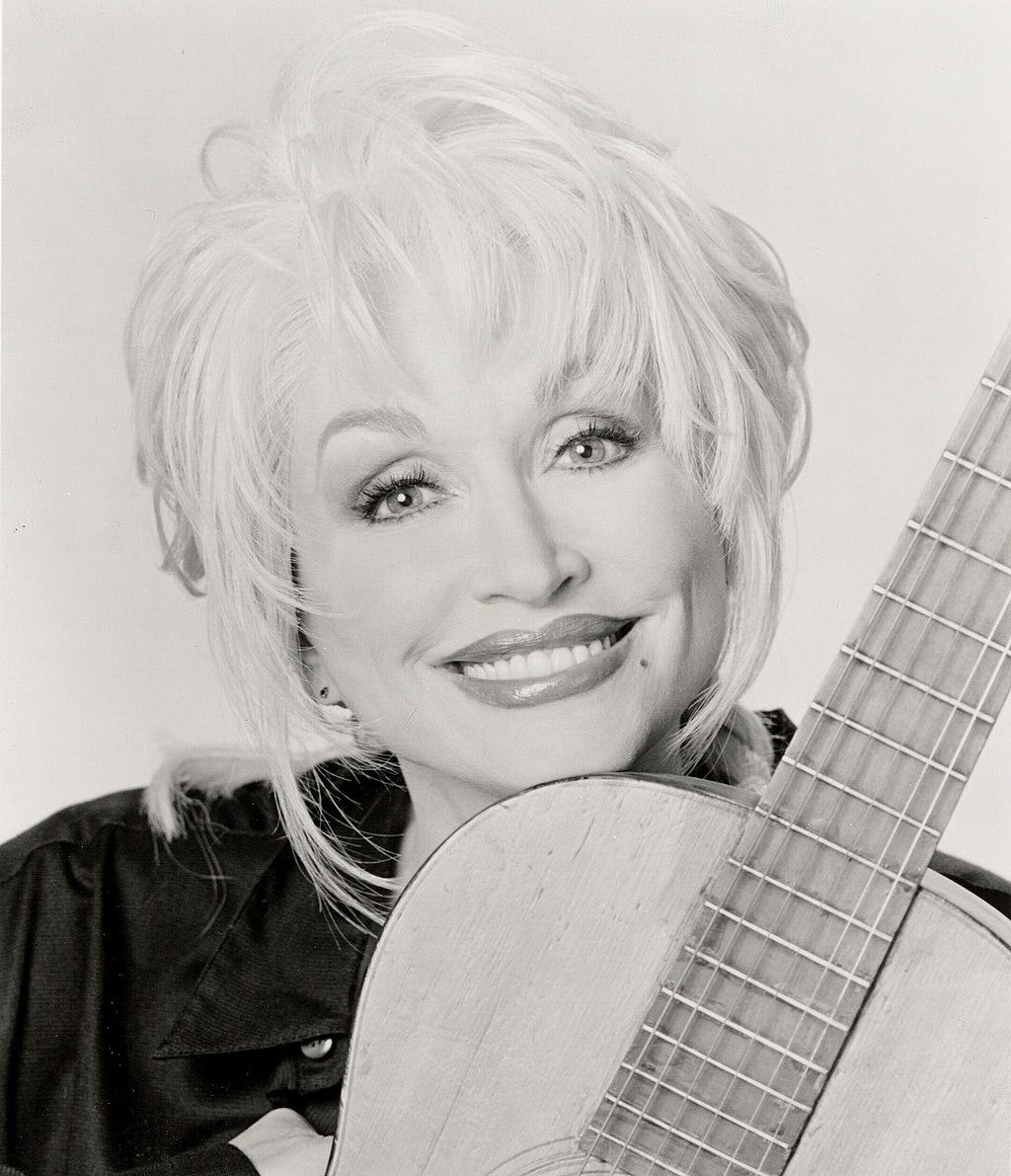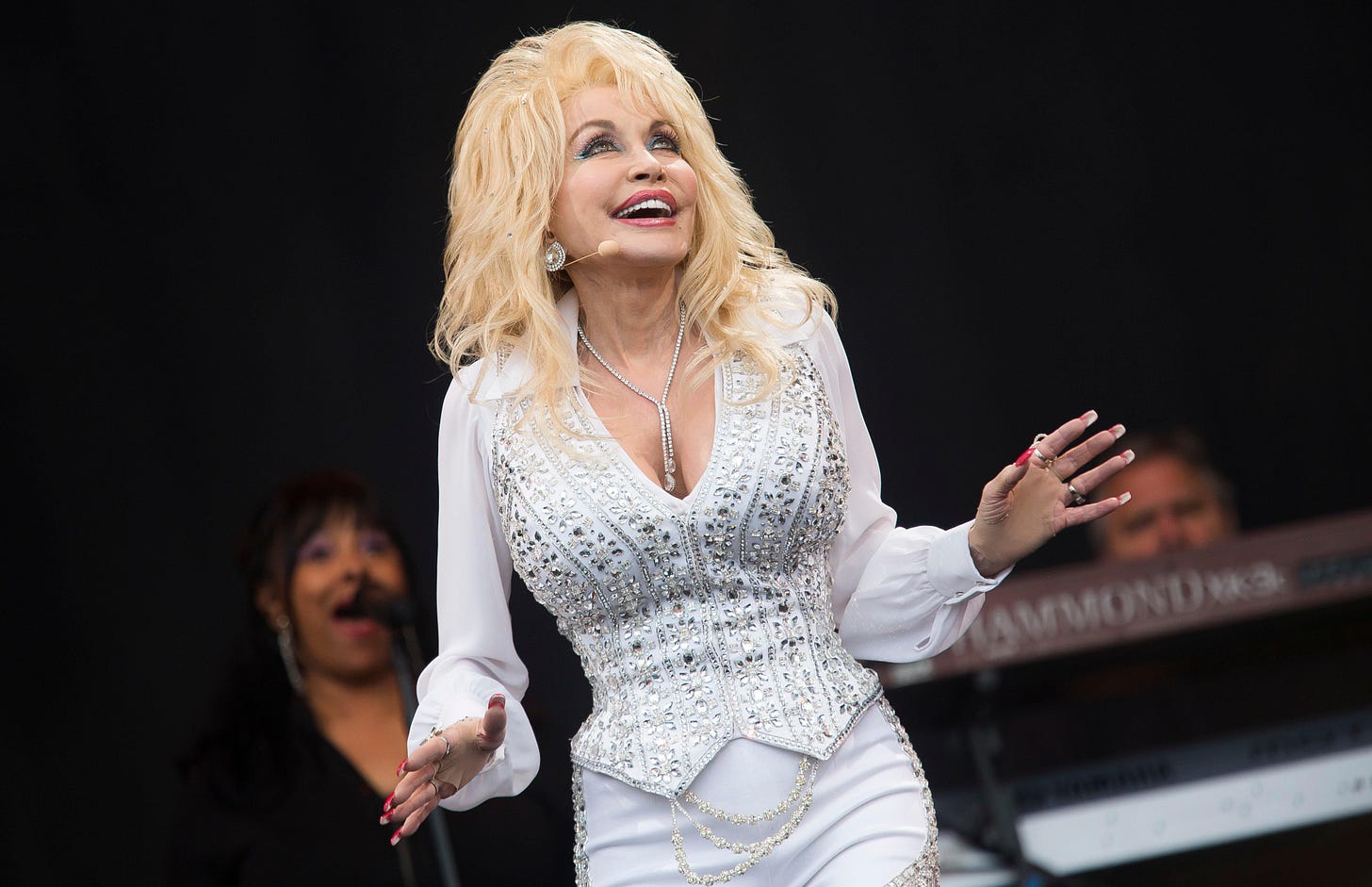I was playing piano at Ellendale’s, then a popular restaurant in Nashville, when one of the servers rushed up, almost hyperventilating. “Oh, my God!” she gasped. “Dolly Parton was just seated at my table!” Other staff members clustered around her, asking for details. “What’s she like? What did she say?” The server calmed enough to reply. “I was so nervous! I just couldn’t catch my breath. But she smiled and said, ‘Now, honey, calm down. I ain’t gonna bite. Fact is, I’m country just like you! So don’t you worry, girl! What’s on the menu?”
For the next hour or so we received updates: “She eats just like a little bird, just a few bites from each part of her dinner. ‘I have do, darlin’,’ she said. ‘That’s how I keep my girlish figure.’ Then she giggled and I did too! She’s just so sweet!”
A short while after that, I looked up from the keyboard and saw Dolly herself, peeking at me from around a corner in the room. She gave me this big smile, which I returned. And that was that.
Our paths crossed a few times after that, most memorably at the Grand Ole Opry, where I stood just a few feet from her as she serenaded her former partner, mentor and for a while legal adversary Porter Wagoner with “I Will Always Love You.” They’d had a complicated history, all of which led to this night when Waggoner, racked by lung cancer, sat in the spotlight he’d known so well for so many years. But we’d never spoken until this interview, assigned to tie in with the release of her album Pure & Simple.
Unlike most of the transcripts I’ve assembled here, this one focuses pretty much on that album, only one of the fifty that she has recorded since her 1967 debut, Hello, I’m Dolly. Like much of the country music catalog, her work centers on songs about love, though sometimes in the context of a storyline, as with “Jolene.” At the same time, many of her classic songs follow the narrative tradition of country lyrics in reminiscing and romanticizing her backwoods background: “Joshua,” “Coat of Many Colors” and “My Tennessee Mountain Home.”
But Pure & Simple stands out because it was specifically on love as its thematic foundation. That seemed like a good place to start when we together got on the phone.
****
This album is all about love.
I did think about that. I was thinking about what kind of an album I would do with the title Pure & Simple, which is what we’re calling the tour because we’ve broken down the tour to where we don’t have a whole lot of music [i.e., a simplified acoustic format]. I thought, well, the title of the tour is Pure & Simple, so I need an album Pure & Simple and I need a song called “Pure and Simple.” So I started writing the song. It was a love song. Then I was like you: When I wrote that I thought, “What is this album gonna be about?”
This is my fiftieth anniversary — the fiftieth year I’ve been married. I thought, well, maybe this should just be a love album. I’d never written an album that was completely just love songs. It’s a “love of many colors,” as you’ve noticed. It covers all kinds of love. I just thought it was a good time to do that.
It’s like a valentine to your husband.
A whole lot of songs in there have to do with us. Then I thought, “I need to write songs about all colors of love.” There’s your cheatin’ love in there; that’s “Can’t Be That Wrong.” There’s a couple of corny little songs, like “Outside Your Door,” where it’s a little playful and flirty. “Head Over High Heels” — that’s how you feel when you first fall in love. It’s all the shades of love.
Country music charts these days don’t feature a lot of love songs. There are songs about parties and drinking. Is love now an old-fashioned subject?
I do notice that. I don’t really have what it needs that they would play my album on the radio. I wasn’t expecting it but I wrote it because I have to write what I feel. It would be wonderful if they did. But I do think it’s almost like when we did the Coat of Many Colors movie. People don’t even have movies anymore about family and faith-based things, kind of like Little House on the Prairie or The Waltons. With the music that’s being played, you have to have a party in order to get on the radio. Hopefully the fans will enjoy it or at least listen to this. And it might get played on the radio. Who knows?
Is this album a tonic for our times?
Yeah, I’d like to think that. I like to think they’ll take to that in that way. Then maybe we’d have a hit album as opposed to just having an album.

When did you first fall in love?
I was very young. I’m always been a hopeless romantic. I think I fell in love in grammar school with this little boy. We wrote letters back and forth. I still have them! That’s how romantic I am. But you know, people ask, “How old were you when you had your first real love?” I think childhood love is just as real as grownup love, don’t you? You feel just as much as your little heart can hold. I remember those feelings when I was just a kid. My heart would get as full as it could get. It’s been the same through the years; you can only love what your heart can hold at that time.
There’s “love” with a lower-case initial letter. Then there’s “Love,” with a capital letter. When you met your husband, was that a whole new definition of love?
That’s very true. They talk about love at first sight and that really was true for the both of us. It was very out of character for him to fall that hard ‘cause he had never even had a serious girlfriend. Of course I’d had tons of boyfriends but I never had anything that hit me that solid right between the eyes and that deep into my heart. So, yeah, there is that type of love where you feel like nothing else can compare to that. But don’t you always feel that way, no matter how many times you fall in love? It’s like “this is the best one yet!” That’s what’s good about love!
Flying Solo
Did you write all these songs by yourself?
I wrote all the songs alone. I didn’t have any co-writers on this one.
Because you wanted to make this as personal a reflection on love as you could.
That’s exactly right. I didn’t want to share that particular feeling with anybody else. I produced it too. Of course I had my guys who worked with me. But I came up with all the songs. It was written, arranged and produced by me with help from Tom Rutledge [general manager, Dolly Parton Enterprises/Velvet Apple Music] and [producer] Kent Wells filling in filling in their two cents’ worth when I needed it. It was a love of the heart. This was my project — my love project.
“I really enjoy my time alone when I write because that’s like my personal time with God: I open myself up and see where it goes.”
When you co-write, what you come up with may be a little less personal than when you write on your own. At one point on this album, you sing “let’s have two glasses of wine, red and white.”
Actually, I’m good at love. My husband and I get married again after fifty years. This is his first marriage and mine, except now we say we’ve been married twice but to each other. Anyway, I just thought this was a good time to write the love songs. The more I got involved in it, the more love seemed to come out. I remember all the loves and all the dates and all the occasions where you do have some wine. I can draw from what I’ve shared with my husband and other feelings and relationships that I’ve had through the years with friends or people I know. So I did not want to involve other people. You said it so well when you talked about having co-writers: You have to share that with someone else. It may be musically better but personally it mostly never is. I do enjoy writing with other people but I really enjoy my time alone when I write because that’s like my personal time with God: I open myself up and see where it goes.
Which song on this album came to you most quickly? And which took the most work?
They all came pretty easy. I probably rewrote the song “Can’t Be That Wrong” at different times through the years. But that was a cheating song; maybe I just was feeling guilty [laughs]. I was thinking, “I better get this thing right or somebody’s gonna think I’m screwing around!”
But “Pure and Simple,” that thing just jumped out. I hardly even had to write it because it is so pure and simple. Another one that came so fast is “Never Not Love You.” That’s probably my favorite personal song on this album. I was just playing on my 12-string guitar; I love the sound of it because it just rings as you play it. I wasn’t really thinking about writing anything in particular. I’d just gotten a new guitar and I thought, “Wow, this thing has a great sound.” I started playing and I hit that little lick. It sounded good on that guitar and all of a sudden I thought, “Wow, I love this tempo. I love this sound. I love this little lick. I’m gonna write a song around that.” So that one came pretty fast.
“Love is love: You can’t stop it no matter what form it takes. Whether it’s right or wrong, you cannot stop it.”
“Can’t Be That Wrong” does stand out from the rest of the album’s focus on the purity and innocence of love. It’s also the most narrative song on the album as it portrays another side of love. What does that conflict between right and wrong in love mean to you?
Actually, I wrote this song from true feelings. This happened to someone I know very, very well, someone very close to me who loved the person they had at home but they fell head over heels in love with someone outside. That was so overwhelming that they were just completely torn to pieces. I saw firsthand how sincere they were in their love for both of those people. I mean, love is love: You can’t stop it no matter what form it takes. Whether it’s right or wrong, you cannot stop it. So I thought, “There are so many people out there who for one reason or another aren’t that happy at home. Or maybe they are happy and it’s possible to love two people.” So I had some good stuff to draw from and I just put myself in that place, knowing what I’d seen. I know that it’s real. I’m not one to judge what’s right and what’s wrong anyway, but I know that when you’re in that place …
One of my favorite lines was very powerful. Somebody said to me, “You cannot say that! You’re Dolly!” I said, “Well, I can say it because I’m Dolly the songwriter.” The tag line says: “To hell with Heaven if it means I lose you.” It’s one of those lines that, if you’re a songwriter, you think, “Oh, my God! I’m writing this song!”
You put it right at the end of a big coda and your voice jumped up. You really underscored it. Maybe your point was that all of us who experience all kinds of love, including those that some people might disdain, deserve understanding and compassion.
When you’re that in love with somebody, if something means that much to you, and you’re saying “This is not right, you’re going to go to hell” and all that, then you say, “Well, the hell with Heaven if it means I’m gonna lose him.” That’s how passionate you are when you’re in that place. I don’t have to make excuses as a songwriter. If somebody wants to condemn me for it, fine. I was just excited because I thought that was a great line [laughs].
“I hope they go do some Viagra, buy my CD and have a big old time listening to it.”
The love that feels most special is the enduring love you celebrate on many of these tracks, including the last one, “Tomorrow Is Forever.” What would you say to people who maybe feel this kind of love isn’t a part of their picture?
Well, I hope it does reach them. I hope they go do some Viagra, buy my CD and have a big old time listening to it [laughs]. Get with it! *
Like I say, this is a good year to write about this because I’ve spent fifty years with the same man, a good man, a man that I’ve had so much fun with. We’ve had our heartaches. We’ve gone through lots of stuff together. We’ve always shared a lot of love, though. In fact, we’re best friends. We have a mutual respect. So I wanted to say, yes, is such a thing as true and lasting love. That’s pretty much what the bulk of the album says.
The single is “Pure and Simple.”
I believe so. it really is pure and simple. It reminds me of some of the older songs I used to record many years ago, even with The Porter Wagoner Show. I don’t know how people will respond but I think a lot of people have the pure and simple love. That’s my take to it. It’s easy-going and easy to sing.
Travelin’ Light
What kind of shows will you do on your upcoming tour?
Let’s go back to what I said earlier about Pure & Simple — that’s the name of the tour. It’s just me and three guys onstage. We swap off different instruments and different harmonies. I tell stories. We don’t have any bells and whistles or big production numbers. I do segment where I do several of the big hits that people expect — “9 to 5,” “I Will Always Love You,” “Here You Come Again,” “Jolene,” all of those. I’ll do a couple of songs from the Pure & Simple album. Then I’ll do a few things where I can play different instruments — my little “Applejack” song where I play banjo. I believe it’s got something for everybody.
What kind of venues will you be performing in?
Some of them are very big venues. We’re playing some stadiums. But then we play some theaters where there are maybe three or four thousand.
“People don’t come to see me be me. They come to see me be them because they I think they feel like I’m one of them.”
How do you connect with thousands of people in a big venue?
Well, people know who I am and they kind of know my stories. I’ve always said that people don’t come to see me be me. They come to see me be them because they I think they feel like I’m one of them. I grew up in that Cinderella rags-to-riches story. They know where I’m from. They relate to my story. So they’re familiar with me, almost like a family member, an older sister or a favorite aunt, somebody they’ve always known. They just seem to be there with me and I love that.
Country music has exploded in recent decades. Is that both a good and a bad thing?
First of all, country music has always managed to survive. It has gone through all its stages, from pure country to Willie and Waylon and the Outlaws and of course now all the new phases. Still, a lot of those young people want to go back and study the true, authentic country music, like mine and like George Jones. There’s always gonna be enough people who love the history of country music to save that. It’s good that it’s taken so many colors. There’ll always be country music — real true, authentic country music.
###








Beautiful!